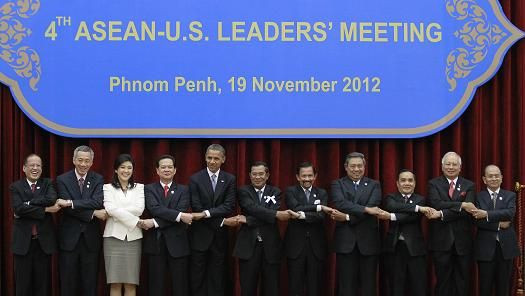Obama Faces Serious Challenges in ‘Pivot’ to Asia

One of the many foreign policy challenges that U.S. President Barack Obama now faces is the need to show nations in Asia that his much-heralded “pivot” to focus greater U.S. attention on them is a real policy and not just rhetoric.
Obama suffered a setback in efforts to build stronger ties with Asian nations after he was forced to cancel an important trip to the region in October to focus on ending the partial government shutdown and averting default on the national debt.
The U.S. president’s absence from critical multi-national meetings and state visits to Malaysia and the Philippines raised predictable questions about the strength of America’s commitment to the region.
Obama realizes the trip was important. “I should have been there,” he said at a news conference after announcing he had to stay in Washington to deal with Congress. “It’s almost like me … not showing up to my own party. I think it creates a sense of concern on the part of other leaders."
There’s no question that the president’s objective of pivoting U.S. policy and resources toward Asia suffered when Obama missed the chance to engage directly with Asian leaders on key elements of his political, diplomatic, economic and security agenda. Instead, China’s top two leaders grabbed the limelight at the regional meetings.
The trip cancellation also inadvertently perpetuated longstanding self-doubts within the 10-country Association of Southeast Asian Nations (ASEAN) about the group’s internal cohesion and its importance to the U.S., China and other major powers.
Besides missing the annual ASEAN Leader’s Summit with its external dialogue partners and the associated East Asia Summit (EAS), Obama was also absent from the annual leaders’ summit at the Asia Pacific Economic Cooperation (APEC) forum in Indonesia.
At the APEC meeting, Obama had planned to promote his signature trade initiative – the Trans-Pacific Partnership negotiations. At the ASEAN summit and East Asia Summit, the president had intended to underscore America’s commitment to deeper engagement with Asia.
Obama’s absence from the ASEAN meeting came at particularly challenging time for the organization. The fanfare surrounding the impending launch of ASEAN Economic Integration 2015 has not answered doubts both inside and outside the region about how successful the integration will be.
Integration will be difficult because rather than trading extensively with each other, many ASEAN countries export the same commodities – such as palm oil, rubber, and timber – and compete to attract foreign investment from developed nations such as Japan, the U.S. and members of the European Union.
Most of the ASEAN governments welcome growing American engagement with their countries as a timely balance to a rising China. They also place high importance on their fast-growing trade and economic ties with China.
But ASEAN members are nervous about Beijing’s growing influence, its rapidly increasing military power and its use of bullying tactics to advance maritime territorial claims to other countries’ rightful 200-nautical-mile Exclusive Economic Zones in the South China Sea.
Obama’s cancelled state visit to the Philippines was a missed opportunity to show American opposition to China’s occupation of Scarborough Shoal, a rich fishery less than 100 miles from the Philippines’ shores. The president could have underscored American support for Manila’s position by stressing the importance of the long-standing U.S.-Philippines alliance and the necessity of a rules-based international order to preserve regional peace and stability.
Beijing is eager to promote economic integration with the ASEAN countries, but strictly by dealing individually with one nation at a time. The Chinese government resists substantive engagement with ASEAN as a group on a long-proposed Code of Conduct for the South China Sea.
To most ASEAN governments the risk is not that they will be forced to choose between the U.S. and China. Instead, the ASEAN nations fear that U.S. reengagement with their region will be insufficiently substantive, or that America will give higher priority to its relations with China at their expense.
In President Obama’s absence, Chinese President Xi Jinping and Russian President Vladimir Putin became the headliners at the APEC meeting. Chinese Premier Li Keqiang took center stage at ASEAN meeting in Brunei, where he was not challenged to defend Beijing’s aggressive tactics in asserting its highly disputed maritime territorial claims. Instead, Li had an open forum to tout a South China Sea of "peace and friendship” – Chinese style.
Chinese President Xi also underscored his nation’s rising influence by extending his trip to visit Australia, a key U.S. Pacific ally. In a country already anxious about over-dependence on now flagging mineral exports to China, newly elected Prime Minister Tony Abbott declared that “China’s growing strength is a benefit to the world, not a challenge.”
China has effectively split ASEAN into two groups – the countries with South China Sea claims that are engaged in disputes with China over the boundaries of territorial waters, and the landlocked countries that share land borders with China and in some cases are fast becoming Chinese client states.
Still, ASEAN’s staying power over several decades of major geopolitical change is a remarkable achievement. The organization plays an important role as a means for engaging with major powers over terms of trade and market access.
The United States remains highly valued by ASEAN members as a balance to China. A cohesive ASEAN benefits U.S. regional interests. The question is whether either ASEAN or the United States and its Asia-Pacific allies can meet the needs and expectations of each other.
Richard Cronin is director of the Southeast Asia program at the Stimson Center, a nonpartisan and nonprofit international security think tank.
© Copyright IBTimes 2024. All rights reserved.





















